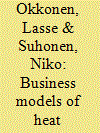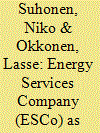|
|
|
Sort Order |
|
|
|
Items / Page
|
|
|
|
|
|
|
| Srl | Item |
| 1 |
ID:
096711


|
|
|
|
|
| Publication |
2010.
|
| Summary/Abstract |
This paper presents the business models of small-scale heat energy production in Finland. Firstly, the development of heat entrepreneurship in the country is presented, including the remarkable growth of small and medium size enterprises (SMEs) in the last 15 years. Secondly, the concept of business model (business architecture of product/service flows and earning logics) is modified to the framework of wood heat production. The business model concept, and its sub-concepts, is applied in a brief review of current heat energy businesses in Finland. We arrive at a business model of heat entrepreneurships that are public companies/utilities, public-private partnerships, private companies and cooperatives, Energy Saving Company (ESCO), network model of large enterprise and franchising. Descriptive cases of these models are presented. Finally, the paper concludes with a discussion on the applicability of the business models in different operational environments and geographical contexts.
|
|
|
|
|
|
|
|
|
|
|
|
|
|
|
|
| 2 |
ID:
166491


|
|
|
|
|
| Summary/Abstract |
The biomass-based heat entrepreneurships and heating cost reductions can generate long-term socioeconomic benefits on a local and regional economy. This analysis focuses on a small community, called Eno, located in predominantly rural region of North Karelia and demonstrate previously unknown socioeconomic impacts of energy cost reduction. We ask in this paper what type of long-term income and employment impacts heat entrepreneurship has from start-up to growth and maturity production stages. According to the socio-economic impact analyses, the total employment impacts of the Eno Energy Cooperative in 2000–2015 were approximately 160 FTE's and the total income impact in the same period was about 6.7 million euros. Results proved that besides to traditional socioeconomic impacts, the energy cost savings, and their induced impacts, can increase and even double the development benefits of bioenergy utilization. Previously known direct, indirect, and induced impacts of the investments and production are only a part of the socioeconomic impact of bioenergy production. These impacts are often analysed without understanding the profitability of bioenergy systems, and public and private benefits of reduced energy costs. This paper concludes with generic discussion on socio-economic impacts of bioenergy, which can be utilised in local policy advocacy.
|
|
|
|
|
|
|
|
|
|
|
|
|
|
|
|
| 3 |
ID:
125578


|
|
|
|
|
| Publication |
2013.
|
| Summary/Abstract |
Energy Services Companies are widely implemented for improving energy efficiency both in the public sector and industry. The model has also been introduced as a business model for biomass-based heat entrepreneurship. However, the residential sector has been problematic with regard to ESCo adoption and constitutes a minor share of ESCo operations. The barriers, both social and economic, are many. This paper focuses on the application of ESCo as a business model for heat entrepreneurship in Finland. First, we present the ESCo model and a review of the main barriers. Second, we present the modelling with aspects of profitability and risk sharing. Third, we demonstrate the operation in the residential sector by using 26 housing associations as a case study. We simulate the energy investment, profitability of operation, and the sharing of risks between the customer and the ESCo. The results indicate that the ESCo model is challenging in our case area. Low profit levels and the assumed customer's preference for achieving cost savings from the beginning of energy renovation can result in long contract periods tying up the capital. The ESCo model is unattractive in the current business climate, requiring modifications or integration with other maintenance services of housing associations.
|
|
|
|
|
|
|
|
|
|
|
|
|
|
|
|
|
|
|
|
|